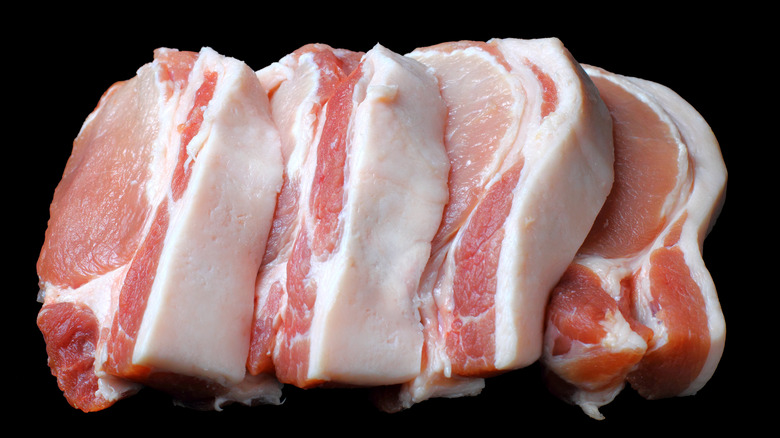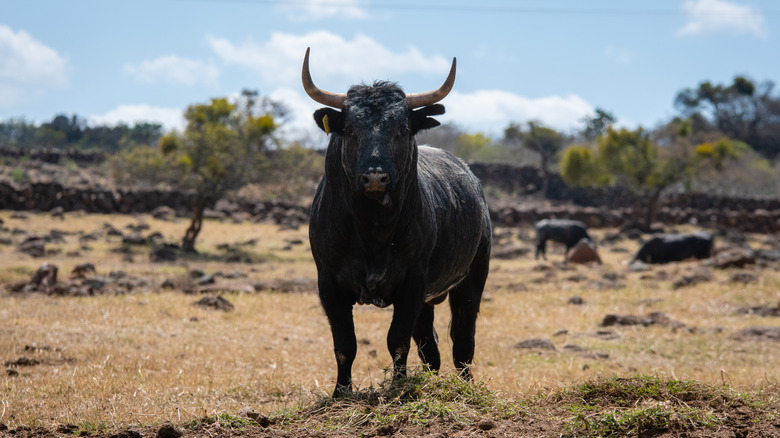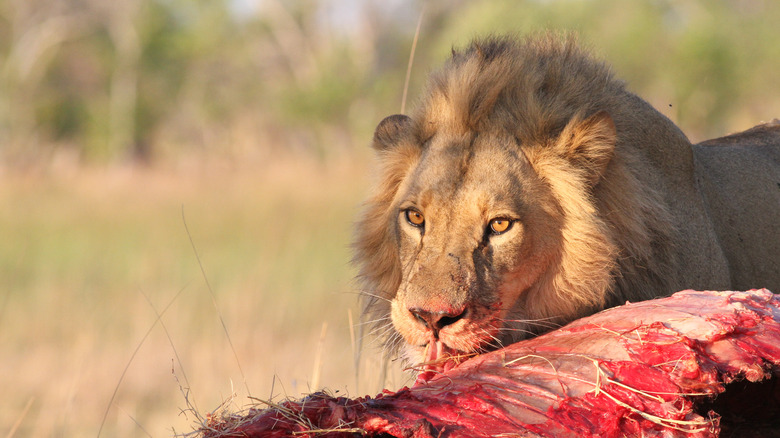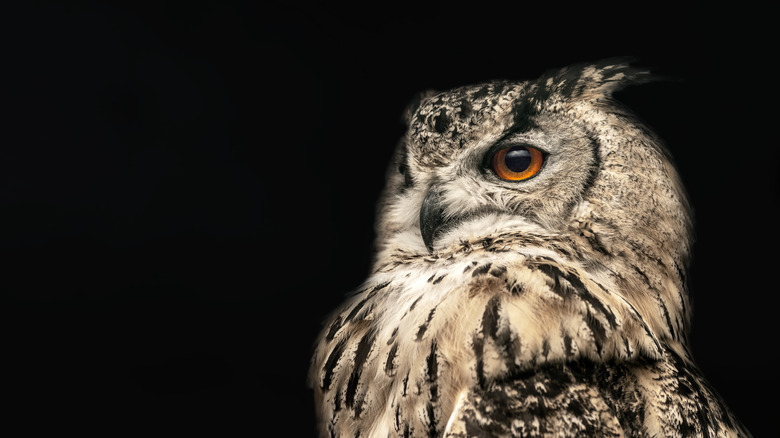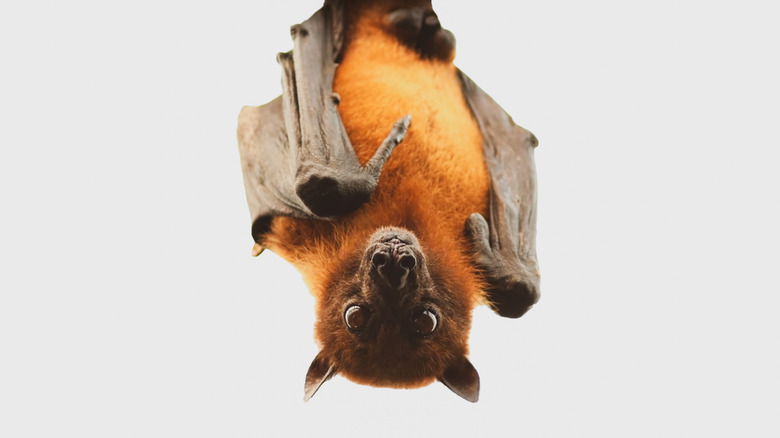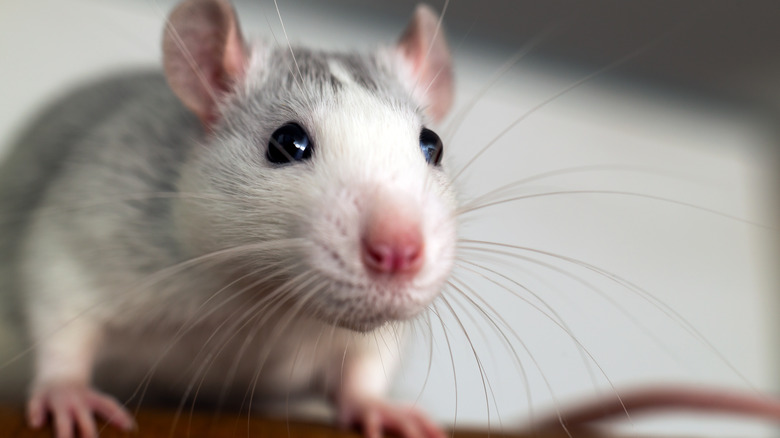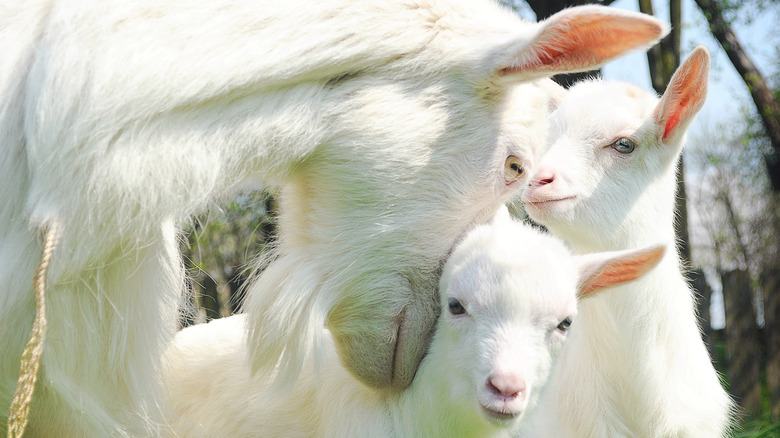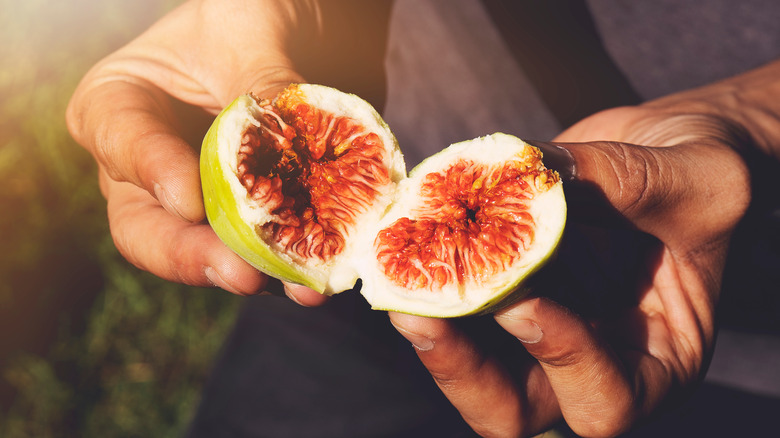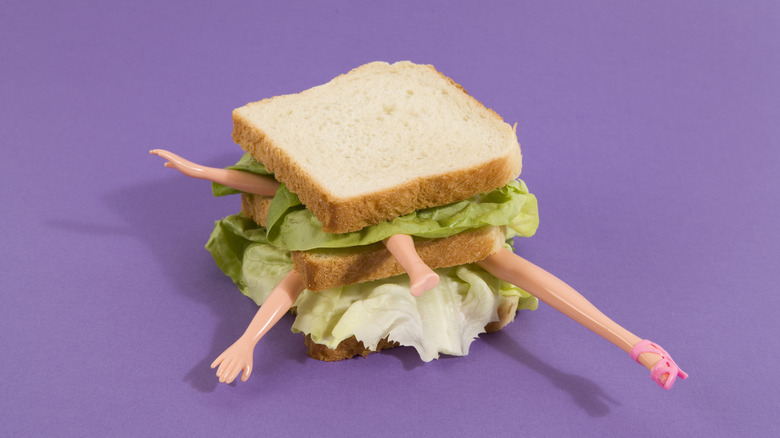Unexpected Foods That Are Forbidden In The Bible
When it comes to dietary restrictions observed for religious reasons, one of the most famous might be meat-free Fridays, especially during Lent. It's a rule that's been around for a long time: Even in the Middle Ages, people were finding creative ways around it. (Beaver, anyone?) It's definitely plucked right out of the Bible, isn't it?
Nope! According to NPR, traditional teachings suggest that since Christ was crucified on a Friday, the faithful should fast in memory of the sacrifice. That goes all the way back to the first century, and when you look at the technicalities of that fast, it's only "the flesh of warm-blooded animals" that's forbidden.
So, what exactly does the Bible say about forbidding certain foods? While there's a lot to sift through, let's start with a disclaimer. The Bible is a complicated work that sometimes contradicts itself, and here's an example. In Mark 7:18-19, Jesus says this after the Pharisees see his disciples eating food deemed "unclean": "Listen to me, everyone, and understand this. Nothing outside a person can defile them by going into them. Rather, it is what comes out of a person that defiles them."
Food for thought!
This fluid is across-the-board off-limits
There's a few basic rules that a lot of the guidelines are based on, so let's talk about one — everything else will make much more sense with a bit of background. Leviticus 3 is pretty graphic stuff, and it details the finer points of sacrificing and offering animals to God. At the end, there's a clear message: "This is a lasting ordinance for the generations to come, wherever you live: You must not eat any fat or any blood." There's no explanation given before it moves on to more sacrificing, so what's the reasoning?
The Massachusetts Bible Society suggests that blood is off-limits because it's the physical equivalent of the spirit: It's responsible for transporting oxygen and without blood, there is no life. Leviticus adds that the blood of sacrificed animals should be splashed on the altar, which means that instead of this life-giving liquid being consumed by a person, it should be more properly given back to God.
That absolutely hasn't been the case at all, though. Different cultures have made different varieties of blood sausage — like the black pudding pictured — going well back into ancient Greece, and it's been a staple in times and places where no bit of an animal is wasted.
Fat has been a bad thing for a long time
Here's another one of those all-encompassing rules that has a major impact down the road. Today, we know that there are all kinds of good and bad fats, and keeping track of how much we're eating will go a long way to living a healthier life. It turns out that we've known that for a long time, as according to Leviticus 3:17: "You must not eat any fat or blood."
What gives? The Massachusetts Bible Society says it's about symbolism. The fat of an animal provides a source of energy when times are tough, and in turn, it's representative of abundance and plenty. On the other hand, too much fat can also be bad. It's connected to greed, making others suffer for our indulgence, and gluttony is worthy of some serious fire-and-brimstone punishment.
They say, then, that giving fat back to God instead of eating it is a way to acknowledge the abundance of food we're given, and help make sure everyone continues to be provided for.
Interestingly, Rabbi Micha'el Rosenberg has an additional interpretation. He says (via Jewish Boston) that the passage also indicates fat is just as important as blood. While blood gives life, fat protects it by cushioning organs. It's a gift from God.
An ox that's gone bad
Here's one that's incredibly specific. Exodus 21:28-29 says, "If a bull gores a man or woman to death, the bull is to be stoned to death, and its meat must not be eaten."
According to the Brackenhurst Baptist Church, there's a few things going on here — and the part about stoning the bull is important. For starters, stoning a creature to death causes enough trauma that it's impossible to drain the animal of blood, which makes it unclean and the meat unacceptable for eating.
Why stone a bull in the first place? They say that the very idea of an animal hurting a person goes against the natural order of things. God put humankind on the top of the pecking order, the interpretation goes, and an ox (or any domesticated animal) that kills a person committed the act in a direct rebellion against God's will, and desire that human life should be respected and honored above all.
Anything killed by another animal
Exodus 22 is filled with a whole lot of information about the do's and don'ts of being a righteous citizen, and included in there are things like making restitutions for thefts, why you should always kill "a sorceress," the protection of widows, and at the very end, 22-31 says: "You are to be my holy people. So do not eat the meat of an animal torn by wild beasts; throw it to the dogs."
It seems like it would be a massive waste, but Enduring Word says there's a few things going on here. For starters, it specifies that men are to be holy — therefore, they're not supposed to be scavenging for food. There's also the idea that a mangled carcass can't be properly bled, and we know by now that makes something unclean. There's something else here, too: It was believed that carnivorous animals were, by their nature, unclean, and would transfer their stains into the meat and flesh of anything they killed.
These are the birds labeled unclean
There's a few different places in the Bible that mention clean — or edible — birds, and unclean ones. First, there's Leviticus 11:13, which is echoed by Deuteronomy 14:11-18. While it gives permission to eat any bird considered clean, there's a major list of forbidden birds: "But these you may not eat: the eagle, the vulture, the black vulture, the red kite, the black kite, any kind of falcon, any kind of raven, the horned owl, the screech owl, the gull, any kind of hawk, the little owl, the great owl, the white owl, the desert owl, the osprey, the cormorant, the stork, any kind of heron..."
The United Church of God says that the Bible doesn't precisely outline why certain birds are clean and some are unclean, but they note that unclean birds are scavengers and carnivores, and they suggest that because these birds regularly eat things that humans can't, forbidding their consumption is a way of protecting people from nastiness down the food chain.
Some say there's more to it: The Enduring Word says anything that consumes blood automatically becomes unclean. (Sorry, chickens, you should have been eagles.)
Sorry, seafood fans: shellfish is right out
A lot of people really, really like shellfish. Mussels, clams, oysters ... how about some lobster, while we're at it? Or some shrimp? If you're going by the Bible, all those are right off the table. That's because of Leviticus 11:9-12, which says (in part): "But all the creatures in the seas or streams that do not have fins and scales — whether among all the swarming things or among all the other living creatures in the water — you are to regard them as unclean ... you must not eat their meat."
The United Church of God says that these non-finned, non-scaly creatures are on the unclean list because they were seen as bottom-feeders and scavengers. Crabs and lobsters were thought to eat carrion, while things like oysters and mussels were believed to consume things like dead plant matter and the excrement of other animals — including people.
That sounds like a perfectly good reason to call them unclean, but seafood lovers, fear not! Today, we know it's not true. Oysters, for example, filters water to feed on algae and phytoplankton (via In a Half Shell), while NOAA Fisheries says lobsters prefer their prey live, including clams, mussels, sea urchins, and the occasional bit of cannibalism, but who are we to judge?
Was the clue to preventing a pandemic hidden in the Bible?
When the COVID-19 pandemic hit, some looked to the Bible ... and then, they pointed. Specifically, they were talking about a prohibition on eating bats. It's included in Deuteronomy 14:11-18, a list of birds that are considered unclean. Bats might not be birds — which has kicked off a major debate about their inclusion for a long time — but they're at the very end of the list: "... the stork, any kind of heron, the hoopoe, and the bat."
Publications — like The Gleaner — went on to suggest that COVID-19 was pretty much mankind's own fault, and if we'd all just listened to the Bible and not eaten bats, 2020 would not have been nearly as terrible. The origins of COVID are still a murky matter of debate, but moving on ...
The Apologetics Press asks why bats made the list in the first place, and chalks this one up to divine wisdom. Bats, they say, were included with birds simply because they're all flying creatures, and they're an important inclusion. Today, we know bats can carry diseases like rabies, and it's suggested that when Moses passed along a ban on eating bats, he was doing it because God knew how deadly it was.
Rabbit is forbidden for a weird reason
Leviticus 11:6 says: "The rabbit, though it chews the cud, does not have a divided hoof; it is unclean for you." Sure, rabbits are adorable and some might find eating an animal some keep as a pet pretty questionable ... but rabbits don't chew cud. Do they?
No, says Apologetics Press, and this verse is often pointed to in order to condemn the accuracy of the Bible. If God knows all, the theory goes, then surely the fact that rabbits aren't ruminants should be on the list ... right? He created them, after all, so why are they forbidden based on something that's just not true?
They argue that the verse just refers to cud-chewing for a little bit of a visual reference as to why they're on the forbidden list, because the way they chew does sort of look like they're chewing cud. Got Questions says it's likely a less-than-perfect translation from the Hebrew version of the Old Testament, and it got the point across perfectly fine: don't eat rabbits.
You didn't want to eat that rat ... right?
Rat might be the last thing on a person's dinner menu, but hey, sometimes you've gotta do what you've gotta do. Not, however, if you're living according to the Bible. There's a whole section of Leviticus 11 devoted to clarifying that no, you shouldn't eat rat ... no matter how tempting it is. Along with rat, it says: "Of the animals that move along the ground, these are unclean for you: the weasel, the rat, any kind of great lizard, the gecko, the monitor lizard, the wall lizard, the skink, and the chameleon."
For this one, the Bible doesn't just say you shouldn't eat the animal in question, it also says that anything they touch is also unclean — and sometimes, it's not something that can be cleansed.
"If one of them falls into a clay pot, everything in it will be unclean, and you must break the pot," 11:33 reads. The same goes for any cooking pots one happens to touch. Oh, and then there's the issue of seeds ... If, for example, a rat gets into dry seeds, that's fine. If one dies in the garden on top of seeds that have been planted and watered, however, that's another story, and the seeds are now unclean.
Sannakji, otherwise known as a live octopus
Food & Wine took an oh-too-close look at a dish called sannakji, which is an octopus so freshly dead it's still moving, or an octopus that's still 100% alive. (Will it climb back out? We don't want to know.) It turns out that eating it is actually forbidden by the Bible for two reasons.
For starters, there's Leviticus 11:9-12, that says "all creatures in the seas or streams that do not have fins and scales ... you are to regard as unclean." That's pretty straightforward as an octopus doesn't have either, but here's where things get super interesting. Trinity Bible Chapel pastor Jacob Reaume learned about sannakji in 2008, and he pointed to Genesis 9:4-6, which says (in part): "But you must not eat meat that has its lifeblood in it." That, says Reaume, is a clear indication that eating something that's still alive is one of the only dietary restrictions that God put on Noah when he and his animals left the safety of the ark.
Octopus, says the Huffington Post, isn't the only animal that's eaten alive. There's also dishes that feature live shrimp, frogs, and even a Guam delicacy that involves eating a perhaps not-totally-dead fruit bat. According to God, they're all off the table.
A baby goat prepared in one particular way
Sometimes, the Bible gets oddly and inexplicably specific. That happens in Exodus 23:19, which reads: "Do not cook a young goat in its mother's milk."
Even the most devoted carnivore has to admit that the idea of cooking a baby animal in his or her own mother's milk is super sad, so ... why is this a thing that even needs to be said? Defending Inerrancy says that no one's entirely sure. God, they say, just gave the orders, and didn't often explain the reasoning behind them, aside from: "Because I said so." The lack of explanations has led to some putting forward the idea that it may have been connected to an occult or idolatrous practice.
The Church of the Eternal God says that the practice was actually part of an ancient Canaanite fertility ritual: taking the milk of a mother goat and boiling her own baby in it — along with mint and butter — was mentioned in literature as a ritual dating back to the 14th century BC. It makes sense, then, that the new religion that was Christianity would want to put a stop to it.
The forbidden fruit almost certainly wasn't an apple
It's one of the most widely-told tales in Christianity: Adam and Eve, the Garden of Eden, a snake, and an apple. The ultimate forbidden fruit. The apple from that one tree in the garden was the one thing that God told them not to eat, and of course, they did — because people just don't listen.
Only, there's absolutely nothing in the Bible that suggests it was an apple at all. Genesis 3:6 says: "When the woman saw the fruit of the tree was good for food and pleasing to the eye, and was also desirable for gaining wisdom, she took some and ate it."
See: No apple whatsoever, and no specifics, either. That hasn't kept scholars from guessing at what it actually was, and one of the most popular is that it was a fig — NPR says it's an idea embraced by Michelangelo when he illustrated the scene for the Sistine Chapel. And it makes sense, as once the pair ate the fruit, LiveScience points out that they used fig leaves to hide behind.
Another intriguing suggestion is that the fruit was either grapes, wine, or a citron, which all actually come from the Middle East and make a heck of a lot more sense than the non-native apples.
The foods forbidden to the Nazarites
The Nazarites, says Christianity, were a group of people who took some time out of their ordinary life to make an extra commitment to God. The most famous was Samson — and his long hair was actually a part of the vow. Instructions for taking the Nazarite vow were among the instructions that God gave to Moses, and they're outlined in Numbers 6:1-21. It starts with abstinence from wine, which is pretty understandable. But it also outlawed other things that came from the components of wine, too.
That was "vinegar made from wine or other fermented drink," and also on the Nazarites forbidden list was grape, grape juice, and also raisins. The verse continues: "As long as they remain under their Nazirite vow, they must not eat anything that comes from the grapevine, not even the seeds or skins."
Interestingly, Chabad says that some Nazirites took the vow so seriously that they would avoid vineyards completely, and wouldn't even sit near someone who was drinking wine. They were, however, allowed to drink alcoholic beverages from other sources — it was the grapes that were the thing.
And here's one surprising meal that isn't strictly mentioned
With all the restrictions the Bible places on what people can and can't eat, there's one glaring omission that's worth mentioning — and that's other people.
Sources like Got Questions and The Outlaw Bible Student confirm that there's actually nothing in the Bible that says, "And on the seventh day, thou shalt definitely not eat thy neighbor." And here's where things get a little tricky. Cannibalism is in books like Jeremiah and Deuteronomy, where God warns that if mankind doesn't get their collective act together, there's going to be some divine wrath coming down and it's going to end with people eating their own children. It's clearly framed as not a good thing, but there's nothing that comes right out and says, "Don't do it."
Books like Genesis go out of their way to separate man from animal, but there's a really wide gap in what sources say is okay. But here's where some reading between the lines comes in. It's a pretty oft-repeated commandment that murder is right off the table, so that takes away the option of killing and eating someone. What about someone who died naturally? Like, if it was a situation where you were doing it purely for survival, and not just because you wanted to see if people really did taste like chicken?
Sorry. Deuteronomy 14:21 says: "Do not eat anything you find already dead." And there you have it!


